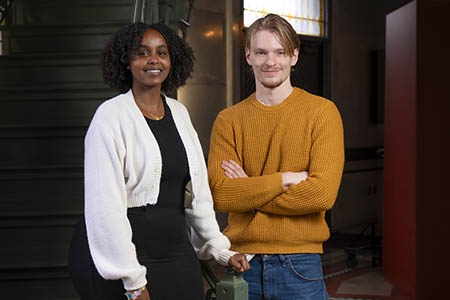Ebyan Abshir ’24 is interested in learning how nations reconcile with the atrocities of the past and transition into an era of peace and harmony.
Samuel Crowley ’24 wants to explore how art is used as a barometer that both defines difference and builds connection across it.
Abshir and Crowley are the latest Union students to be awarded a prestigious Thomas J. Watson Fellowship.
They are among 35 students selected nationwide after nominations from private liberal arts colleges and universities. The fellowship offers a one-year grant to seniors “of unusual promise” to study and travel independently outside the U.S. Each fellow receives a stipend of $40,000.
This year’s class will travel to 64 countries pursuing topics ranging from community-centered AI to agroforestry; from end-of-life care to interfaith advocacy; from seabird communities to soundscapes.
An Africana studies major with minors in Spanish and English, Abshir will travel to Chile, Brazil, South Africa, Cambodia, Germany and Canada as part of her fellowship.
“I will explore how and if various countries confront their traumatic legacies,” she said. “I hope to better understand both unique efforts regarding the creation and preservation of a collective memory of a nation's harrowing history, as well as the erasure of such a memory.”
Crowley, a visual arts major with a minor in mechanical engineering, often carries a sketchbook. He plans to spend time in major cities in Spain, Guatemala, Japan, and Tanzania, meeting and interviewing local artists and creating portrait vignettes.
“I started this practice first at home and expanded it here at Union, creating portraits of friends and peers in a series of two-to-three-hour sessions,” Crowley said. “I mostly work in charcoal and oil paint/pastel. I hope to use art as a framework to explore the social boundaries and cultural intersections in urban communities and find connections across differences.”
Lynn Evans, director of Fellowships and Doctoral Pathways, said being awarded Watson was fitting for Abshir and Crowley.
“Ebyan and Sam have been dedicated to the subjects of their proposed Watson projects throughout their time at Union as reflected in their academic and extracurricular endeavors,” Evans said. “I am so happy that they will have this opportunity to pursue these passions while traveling around the world for a year after graduation.”
The children of Thomas J. Watson, Sr., the founder of IBM, and his wife, Jeanette, established the Watson Fellowship in 1968 to honor their parents’ longstanding interest in education and world affairs.
Since the program’s inception, 67 Union students have been awarded fellowships.
To learn more about this year’s Watson Fellows and their projects, visit the Watson website.
Ebyan Abshir
Hometown: Medford, Mass.
Major: Africana Studies
Minors: Spanish, English
Project: “Preservation of Collective Memory.” How do nations confront, reconcile with, and transition beyond past atrocities? Engaging with national governments, international foundations, social justice and human rights organizations, and impacted community members, I will explore how nations create, preserve, and/or erase their collective memory.
Countries: Chile, Brazil, South Africa, Cambodia, Germany, Canada
Samuel Crowley
Hometown: Washington, D.C.
Major: Studio Fine Arts
Minor: Mechanical Engineering
Project: “Visual Expressions of Communal and Individual Perspective.” Contrasting the social, cultural, racial, economic, and geographic differences in four cities—one each in Spain, Guatemala, Japan, and Tanzania—I will explore how art is used as a barometer that both defines difference and builds connection across it.
Countries: Spain, Guatemala, Japan, Tanzania
